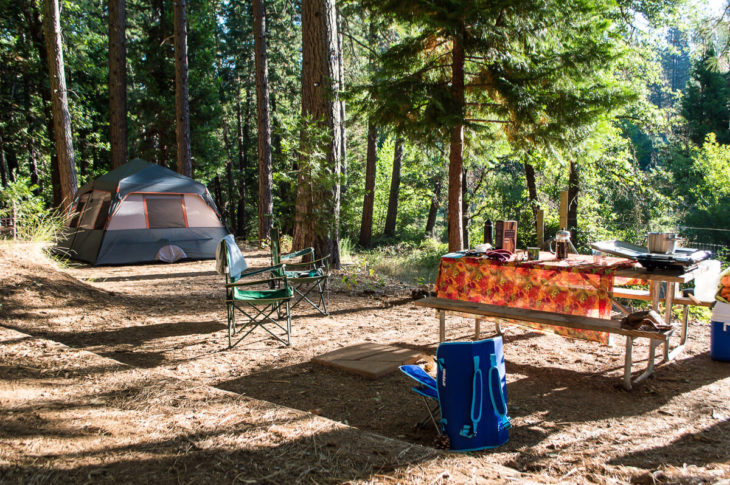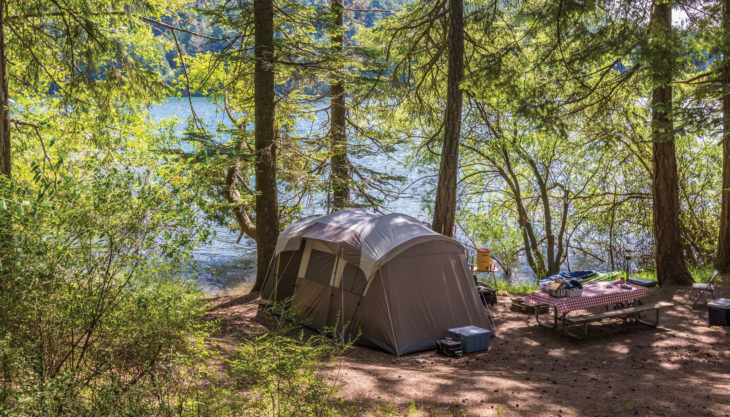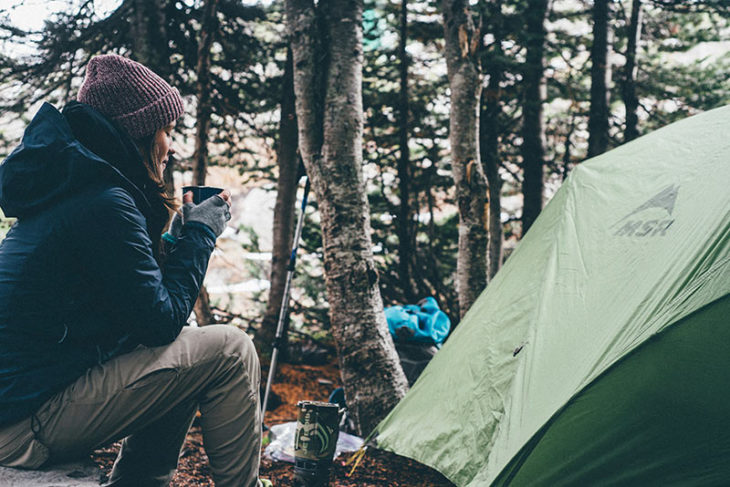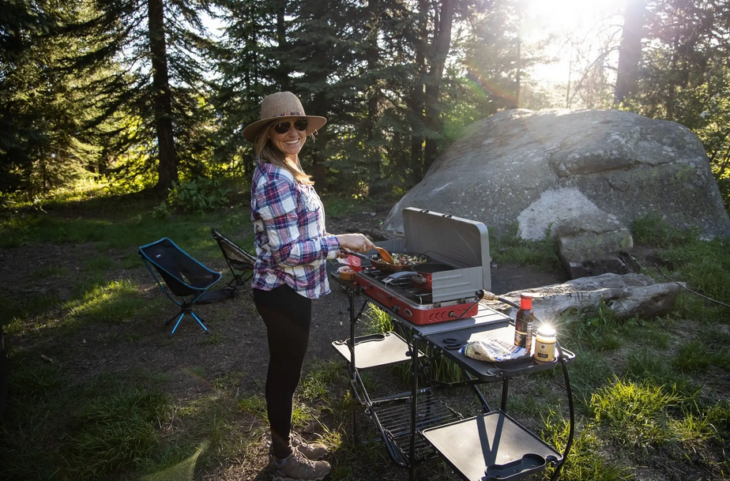Ah, camping! And even for the first time! Not only is it an amazing experience – sleeping under the stars, come on! – but it’s also a marvelous opportunity to be in touch with nature. Opening the tent’s zipper and watching the sunrise is, for many, one of the strongest reasons to do this kind of mini-adventure.
There are a lot of tips in case you’ve never camped before. And, it doesn’t matter if you didn’t do it until now – some people simply need more time to realize numerous lovely sides of it. It’s synonymous with health (you breathe fresh air and in the day you expose yourself to the sun, wonderful source of vitamin D), entertainment and peace. And here, we have these 7 tips that will help you organize and have a great time without thinking much.
Contents
Where should I go?

Source: thisismyhappiness
No matter if you are traveling with children, as a couple, with friends or alone, finding the right place is essential for everything to go well. The best for the first time is to opt for nearby places – you shouldn’t select a very distant one, because in case you don’t like the experience, you can go home whenever you want.
Also, you’ll have to look, especially if you are traveling as a family, if family campsites have activities for everyone. There’s nothing like enjoying sites full of aquatic activities by navigating rivers, fishing, swimming or diving.
You can choose some of the parks or mountains nearby and make sure they offer some activities that everyone can do. Maybe going on floats to navigate the river, rowing boats, kayaks, fishing areas, snorkeling and even diving. Or, if you’re not that crazy for these kinds of things, you can simply choose a nice place near the water, settle there and enjoy the atmosphere without much crowd.
When should we set off?

Source: seattlemag
When speaking about weather conditions, you should make sure that you avoid severe weather. This is about relaxing outdoors, so don’t go camping if you know it’s going to be bad weather. There’s nothing more uncomfortable than sitting in the tent for two days while the rain’s pouring all over it. Just after a storm, it could be just as bad, with the areas soaked in rain and mud.
If we’re talking about the time during the day, you should arrive early enough to give you time to learn the terrain of the campsite. Set up everything during the day, it’s much easier when you can see what you’re doing. And after, when it gets dark, you can relax and have fun, knowing that you’ve arranged everything.
Make a checklist – what should I bring?

Source: medium
New campers often overlook using a checklist. It’s not fun to get to the destination and discover that you have forgotten something. Stay organized and make sure you don’t leave anything by keeping all the necessary equipment checklist. Use it while preparing luggage and marking each item. Update and review the list as necessary. If something breaks or wears out, replace it. If you think you won’t really use some things, remove them from the list.
It’s clear if you are going to camp you need a tent – before anything else. It should be large enough to fit people, luggage and bags. In addition, if you have a covered porch you can leave your shoes without finding them wet in the morning. It’s very important to tie the tent with the stakes, so it’s advisable to bring a hammer so that they do not leave the ground when the wind blows. Putting a large plastic cover on the floor before assembling the tent will insulate you from moisture.
Even if it’s summer, at night it can be quite chilly. Therefore, you simply can’t forget a sleeping bag. Try to adapt to seasonality and make it comfortable, as there are several shapes and sizes. But the bag isn’t everything and you’ll notice this as soon as you lie on the hard and cold ground. The minimum you should place under your mattress is an insulating mat, although you can also use a mattress or an inflatable mat. If you opt for the latter, don’t forget to bring a device to inflate them. Ah! And unless you want to lean on your backpack or a towel, don’t forget to take a cushion to use as a pillow.
If you feel capable of cooking outdoors, then don’t miss a good easy-to-wash pot, in addition to a portable kitchenette, or a grill for cooking over fire. It’s also desirable to carry a good quality knife with you. In case you plan to make meals at the site, in the long run you may miss sitting on something other than the ground. Therefore, a good option is to bring a small table and folding chairs, but only if there’s enough space in the car or the vehicle you came by.
In addition to a small kit with the essentials that would contain tissues, maybe some towels, flip flops, and soap, don’t forget the toilet paper and your toothbrush. Since you’re going to sleep outdoors, you may be attacked by mosquitoes – bring a good repellent, as well as a citronella candle to keep them away.
Regarding clothes, you’ll probably need some shorts and T-shirts in case it’s hot outside, but also a jacket and some trousers in case it gets cold in the evening. You shouldn’t forget socks – thermal ones, too, a hat to protect yourself from the sun and very comfortable sneakers. If the site is next to a river or a lake and it’s summer, ensure you’re bringing some sandals and a swimsuit.
And, in the end, all those other little, but equally important objects that can be useful – such as flashlights, a tape, scissors, rope, clothespins, plastic bags, etc.
What should we eat?

Source: bearfoottheory
New campers don’t always think enough about meal planning. Find out how many meals you will make for how many people, and gather some menu ideas. Then shop one or two days before departure so that the food is fresh. Avoid buying snacks, don’t be one of those who stop at the market to buy food on the way to the campsite.
As for meals, the most comfortable is to use canned and packaged products, although if you have a portable refrigerator to which you can change the ice you can keep food fresh. A pan, a pot, a small bowl, lighters, paper, a razor and the rest of plastic utensils might also be useful when preparing the fire and cooking. Take your own detergent to wash your things in the sink and don’t forget to take garbage bags for waste and a roll of aluminum foil to store food.
Remember to always bring plenty of water. It’s recommended to bring 2 to 3 liters of water per person per day. Since very apart from drinking water, if you don’t find a nearby water source, it will also serve for cleaning functions.
Camping is synonymous with enjoying nature. Wearing a good attitude is essential for everything to go well and that the only memories that you take from this adventure are the wonders that surround you and your crew or your family. In the end, maybe you’ll be so amazed and delighted that you’ll decide to do it again, and again, and again… We recommend you to check out a wonderful story on the website Skoolie Livin – about the couple who made their own camp house from an old bus – we’re sure that it will motivate you to start thinking in the same direction. Or, at least to dream about having your own personal RV and camp wherever your heart wishes!
Doing it for the first time will become a succession of unique moments, and, if everything has been prepared properly, you will only have to enjoy the experience. Therefore, stop hesitating and start preparing for it!
